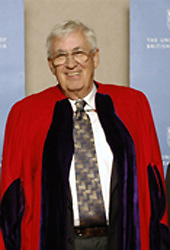Professor C.S. “Buzz” Holling
C.S. “Buzz” Holling, Ph.D., 2 Hon DScs, FRSC is a Canadian ecologist, and Emeritus Eminent Scholar and Professor in Ecological Sciences at the University of Florida. He is one of the conceptual founders of ecological economics.
Ecological economics is a transdisciplinary field of academic research that addresses the dynamic and spatial interdependence between human economies and natural ecosystems. Its main focus is the “scale” conundrum: how to operate an economy within the ecological constraints of the biosphere. Ecological economics brings together and connects different disciplines, within the natural and social sciences but especially between these broad areas.
Buzz earned his B.A. and M.Sc. at the University of Toronto in 1952 and his Ph.D. at the University of British Columbia in 1957. He worked for several years in the Canadian Department of Forestry in Sault Ste. Marie, Ontario.
After working for Forestry Canada, Buzz was, at various times, Professor and Director of the Institute of Animal Resource Ecology, University of British Columbia, Director of the International Institute for Applied Systems Analysis in Vienna, and Eminent Scholar, Arthur R. Marshall Jr. Chair in Ecological Sciences in the Department of Zoology at the University of Florida.
He retired from the University of Florida in 1999, but remains on the faculty as an Emeritus Eminent Scholar.
Buzz authored Adaptive Environmental Assessment and Management and The Functional Response of Invertebrate Predators To Prey Density, coauthored Rights to Nature: Ecological, Economic, Cultural, and Political Principles of Institutions for the Environment and Barriers and Bridges to the Renewal of Regional Ecosystems, and coedited Biodiversity Loss: Economic and Ecological Issues, Biodiversity Conservation: Problems and Policies, Discontinuities in Ecosystems and Other Complex Systems, and Pest Management (IIASA proceedings series).
His papers include Resilience and stability of ecological systems, Economic Growth, Carrying Capacity, and the Environment, Cross-Scale Morphology, Geometry, and Dynamics of Ecosystems, Large-Scale Management Experiments and Learning by Doing, Command and Control and the Pathology of Natural Resource Management, Understanding the Complexity of Economic, Ecological, and Social Systems, Resilience and Sustainable Development: Building Adaptive Capacity in a World of Transformations, Qualitative Analysis of Insect Outbreak Systems: The Spruce Budworm and Forest, and Lessons for Sustaining Ecological Science and Policy Through the Internet.
He has been awarded two major awards from the Ecological Society of America, the Mercer Award given to a young scientist in recognition of an outstanding paper in ecology in 1966, and the Eminent Ecologist Award for “outstanding contributions to the science of Ecology” in 1999. He also received the Kenneth Boulding Memorial Prize in 2000, and an Honorary Doctor of Science from the University of Guelph in 1998. He was awarded another Honorary Doctor of Science from the University of British Columbia in 2007. He is a Fellow of the Royal Society of Canada, a foreign Fellow of the Royal Swedish Academy of Sciences, and has been awarded the Austrian Cross of Honour for Arts and Science.
He was founding editor-in-chief of the open access on-line journal Conservation Ecology, now renamed Ecology and Society. He was also the founder of the Resilience Alliance, an international science network.
Throughout his research, Buzz has blended systems theory and ecology with simulation modeling and policy analysis to develop integrative theories of change that have practical utility. He has introduced important ideas in the application of ecology and evolution, including resilience, adaptive management, the adaptive cycle, and panarchy.
His early work included major contributions to population and behavioral ecology. Later, he was among the first ecologists to recognize the importance of nonlinear dynamics. This early work on predation led to a series of papers, including his 1959 Citation Classic paper in The Canadian Entomologist, in which he developed the notion of functional response, an idea that continues to be a linchpin of modern population ecology.
His 1973 paper on the resilience of ecological systems had a substantial impact within ecology and other natural and social sciences. He has also contributed important ideas to ecological management, including Adaptive management and the Adaptive Cycle. More recently his work on the cross-scale structure and dynamics of ecosystems has been highly influential. This work resulted in the 2002 book Panarchy: Understanding Transformations in Human and Natural Systems.
His work is frequently cited in the fields of ecology, environmental management, ecological economics and the human dimensions of global change.
Watch Dick Bocking’s Buzzschrift Documentary on Buzz Holling. Read The Competition of Beliefs: A System Dynamics Interpretation of C. S. Holling’s Five World Views.
